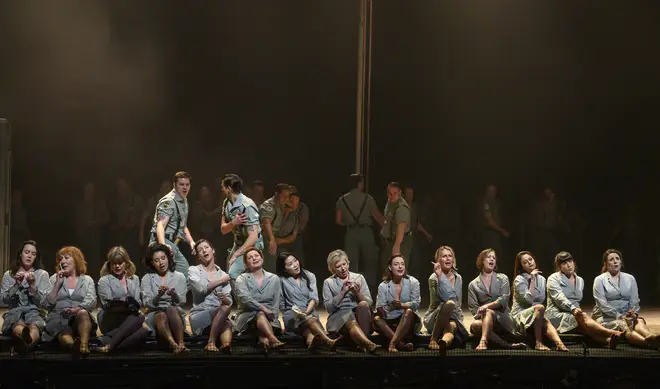Leading UK opera companies have funding slashed in Arts Council announcement
4 November 2022, 14:02 | Updated: 4 November 2022, 14:13

The English National Opera may move to Manchester, while Glyndebourne, Welsh National Opera and the Royal Opera House have also had their funding cut in this morning’s announcement.
Several of the UK’s leading opera companies have seen huge cuts to their annual funding from Arts Council England, in a new portfolio for 2023 to 2026, announced this morning.
The English National Opera (ENO), which is currently based at the London Coliseum in the West End, has lost 100 percent of its annual £12.6 million funding. Instead, the company will receive £17 million in funding across the next three years, which it says it will use to “increase our national presence by creating a new base out of London, potentially in Manchester”, in a statement published to its website.
ENO will continue to manage the London Coliseum which has been the primary venue to date for both ENO and the English National Ballet (ENB) – whose funding has also fallen.
The ENO is among a host of top opera companies and orchestras to see cuts to their annual stipends from the Arts Council. Glyndebourne Productions Ltd will receive 50 percent less Arts Council funding than in previous years, down from £1.6 million to £800,000, with Welsh National Opera’s annual allowance falling by a third to £4 million, and the Royal Opera House allocated £22.2 million – £2 million less than the previous Arts Council portfolio.
Meanwhile, several organisations outside of London and music education providers have received higher allowances than in previous years.
Read more: English National Opera singers share operatic breathing techniques to aid ‘Long Covid’ recovery
As the news was announced on 4 November, a spokesperson for the Welsh National Opera said: “Whilst we are grateful for Arts Council England’s continued support, we are disappointed by the announcement today that we will receive a substantial cut to our funding.
“We fully appreciate the pressures that ACE themselves are facing, but as we experience rising costs and reduced income in the current challenging economic climate, we will need to review the impact of this decision on the delivery of our services in England in light of the announcement.”
Sir Nick Serota, chair of ACE, made the announcement on a livestream alongside CEO Darren Henley and executive director Mags Patten, explaining the difficult decision to withdraw some funding from core cultural institutions. “The position was made relatively clear when the Secretary of State instructed us to take money out of London... and encouraged us to take money from central London to some parts of the city that haven’t previously had funding,” Serota shared.
“It was almost inevitable that we would have to take some money away form some of the main theatres in London. We’ve simply had to make some very invidious choices.”
Other London-based orchestras have also seen decreases in their annual Arts Council funding, including the London Symphony, London Philharmonic, and Philharmonia.
Meanwhile, it’s good news for several classical music organisations based outside of London which have seen increases in funding, as well as various organisations on the ACE portfolio for the first time.
Opera North, the Royal Liverpool Philharmonic Orchestra, and English Touring Opera have all been offered higher funding totals than the previous period, and Paraorchestra and Friends will receive four times as much funding per year than previously, from £249,000 to just below £1 million.
Aurora Orchestra, who are known for breaking down boundaries between art forms, from performing in a London nightclub to incorporating breakdancers, will also receive a large increase in their annual allowance, from £92,000 to £143,500.
Chineke! Orchestra and Manchester Collective are also among those organisations to join the Arts Council’s national portfolio for the first time, receiving annual funding of £700,000 and £120,000 respectively, along with Pegasus Opera, which provides opportunities in opera for artists of African and Asian heritage.

Chineke! Orchestra performs Adolphus Hailstork’s ‘Epitaph for a Man Who Dreamed’
Music education providers are among those to receive significant increases in funding in the Arts Council’s portfolio, following a number of concerns in recent years on the impact of government funding cuts to music education in state schools.
Read more: A level music in schools could ‘disappear’ in little more than a decade
The UK Association for Music Education and Awards for Young Musicians will each receive £400,000 a year, having not been included on the previous ACE portfolio. The arts charity Music for Youth will also receive an extra £108,000 annually, which is nearly double their previous allowance.
National youth music ensembles have also benefitted from the new portfolio: the National Youth Orchestra, Brass Band, and Choirs of Great Britain will each receive around double their annual funding from the 2018-2022 designation, and British Youth Opera will also receive £50,000 annually, up from £42,000.
In a document providing key information on the newly announced portfolio, Arts Council England says £43.5 million per year will be spent in “levelling up for culture places”.
990 organisations in total will receive funding in the new programme, 276 of which are ‘new joiners’, with 21.8 percent more investment outside of London.


































